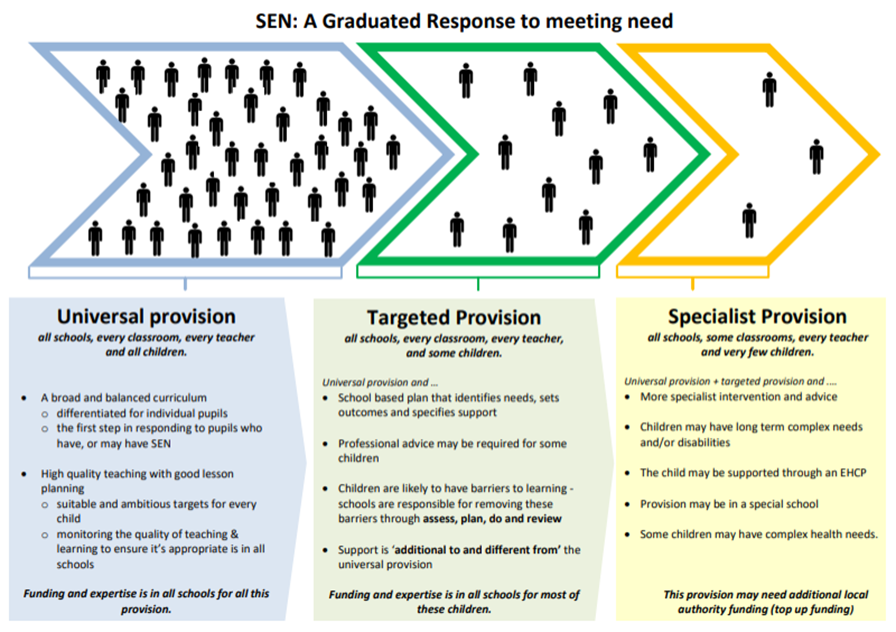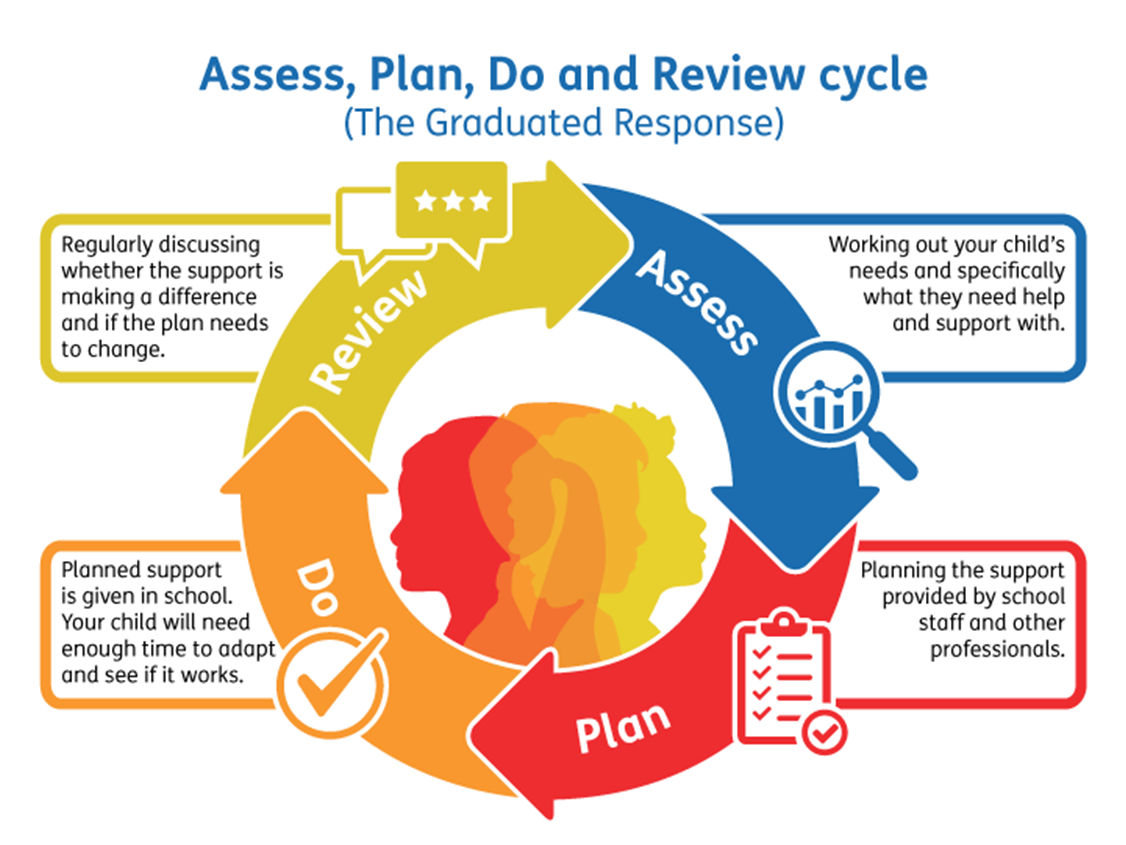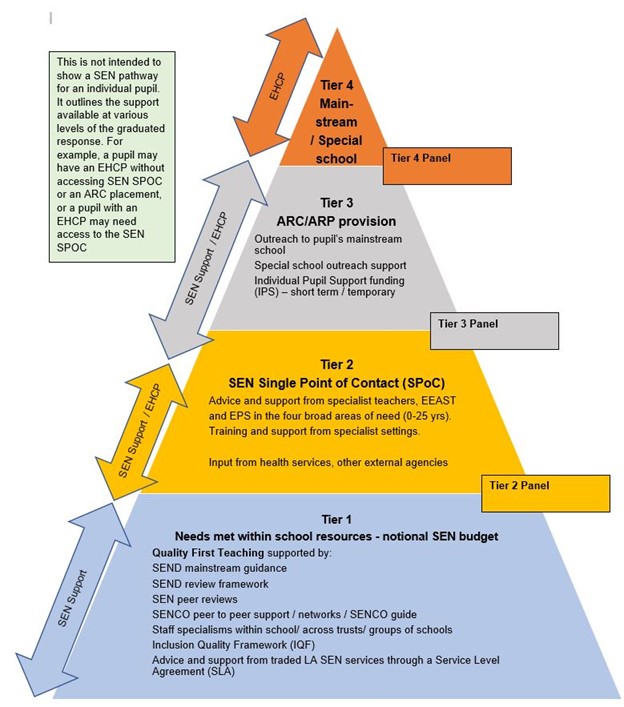Special Educational Needs (SEN) Support
The SEND Code of Practice 2015 says:
All children and young people are entitled to an appropriate education, one that is appropriate to their needs, promotes high standards and the fulfilment of potential. This should enable them to:
-
achieve their best
-
become confident individuals living fulfilling lives
-
make a successful transition into adulthood, whether into employment, further or higher education or training
“Where a pupil is identified as having SEN, schools should take action to remove barriers to learning and put effective special educational provision in place.”
- SEND Code of Practice
Universal provision is the support and provision which is ordinarily available to every child or young person in every educational setting.
Some children and young people need more support – this is called targeted and specialist provision. This support is needs led which means that the child or young person gets the right support in the right place and at the right time. The support may be needed right away or at a point in the future, for short or for extended periods of time.

SEN support is a four-stage cycle also called the Graduated Approach. It is help that is additional to or different from the support generally given to most children/young people of the same age.
The purpose of SEN support is to help children/young people progress.
SEN support should include planning and preparation for the transitions between phases of education and preparation for adulthood.

This part of the cycle is about working out your child’s needs – what they need help with. Your child doesn’t need a diagnosis to have their needs assessed.
Your child’s teacher(s), support staff and the Special Educational Needs Coordinator (SENCO) do this together, working with you and with your child if possible.
They will look at things like:
- the teacher’s assessment and experience with your child
- your experiences at home and what you think your child’s need are
- your child or young person’s views
- the views and ideas of support staff such as your child’s teaching assistant (TA)
- any assessments that have been done
- your child’s progress and how that compares to other children their age
- advice and recommendations from any specialists from outside school, such as an educational psychologist – they should work together with the professionals in school
Your child’s needs should be reviewed regularly. This will help to make sure that the support they get is well matched. Over time you’ll also be able to see what things have been tried and how well they worked. This should help everyone to decide what the next step should be. For some types of SEN, the way a child responds to a particular type of support can be the best way of developing a more accurate picture of their needs.
When the staff at your child’s school are deciding whether they need more support, or what type of support that might be, they should look at all the evidence they have. That includes the progress your child is making individually and compared to other children their age.
As well as putting specific support in place for your child, school staff should also look at anything that’s stopping your child learning successfully. These barriers can then be removed wherever possible.
![]()

Once your child’s needs have been assessed, the support they need can be planned. You should know what support the staff at school are going to give. That should include the support your child will get from professionals from outside of school, such as enablers or therapists.
Plans should be made in partnership with you and with your child, if that’s appropriate. You should:
- agree the outcomes that are important to your child – what progress everyone is expecting and that includes changes in behaviour as well as academic or developmental progress
- agree short term targets from these outcomes – these should be specific, measurable, attainable, relevant and timely (SMART)
- decide what adjustments to school life and rules will be made to meet your child’s needs
- plan what interventions and support will be put in place
- decide a date when you will meet to review what works and what doesn’t work
All of the teachers and support staff who work with your child should know what the plan for their support is and what they need to do. This should be written down somewhere on the school’s information system and you should be able to see and have a copy of the plan too (see more below).
![]()

This part of the graduated response cycle is the actually doing part, where the support is given day to day and week to week.
Your child’s class or subject teacher is responsible for working with them on a daily basis to give the support. They are also responsible for any support given outside of class, such as small group work or individual support.
It’s a good idea to make sure there is a fixed timescale for the support to be given before it’s reviewed. For example, staff might decide to try something for half a term or a term. There needs to be enough time for your child to get used to the support and settle into it. there should also be enough time to realistically see whether it’s making any difference. But, it shouldn’t be so long that you end up wasting lots of time if it isn’t working. Many parents and professionals review support together once a term at a meeting.
![]()

This is the part of the process where you, the professionals and your child think about whether the support is making a difference. This should happen regularly. These are some of the main things to think about when you’re reviewing support:
- Is the support working?
- If it’s making a difference, how much difference?
- Is it happening as it should – so is the right person giving the support, have they had any training they might need, is it happening often enough?
- How is your child reacting to the support – has their behaviour changed for example?
- What does your child think about the support?
Depending on the answers to these questions, your child’s class or subject teacher and the SENCO should adjust the support if needed. That might mean stopping the support and trying something different, changing things a little or a lot or leaving things as they are.
You and your child should be involved in those decisions. You can ask for information about how professionals are measuring how successful the support is, so you can take part in the discussions.
If your child has an EHC plan, the local authority must review that plan at least once every twelve months. It’s a good idea for schools to have their own plan for your child as well, so that short term plans can be made and reviewed using that.
“Schools should meet with parents at least three times a year. Schools should take seriously any concerns raised by a parent. Persistent disruptive or withdrawn behaviours do not necessarily mean that a child or young person has SEN. Where there are concerns, there should be an assessment to determine whether there are any causal factors such as undiagnosed learning difficulties, difficulties with communication or mental health issues. Parents know their children best, and it is important that all professionals listen and understand when parents express concerns about their child’s development. They should also listen to and address any concerns raised by children and young people themselves. ”
- SEND Code of Practice
Newcastle local authority developed a pyramid to illustrate their graduated response and the support that is available to meet the needs of children on SEN support. This includes:
- The support and provision available within the school's notional SEN budget
- The support and provision available from the local authority, including:
- SEND outreach service
- Education Psychology service
- SEMH outreach (Social, Emotional and Mental Health)
- Individual pupil support funding
- Input from health services, and other agencies

You can read our "how to understand SEN support" guide here
Would you like to give us feedback on our service?

